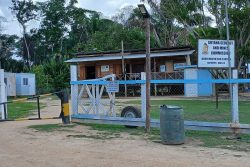In a press release the Canadian High Commission in Guyana said Canada has joined other countries in assisting Haiti since the January 12 earthquake. On January 19, Minister of International Cooperation Beverley J Oda said Canada would make the additional sum available after it had announced the $5 million contribution on January 13. It said the Haiti Earthquake Relief Fund will allow the government to match, dollar-for-dollar, the generosity of Canadian citizens for a total of up to $50 million.
This announcement brings Canada’s total pledge to $135 million involving contributions to the United Nations (UN) and the International Federation of the Red Cross (IFRC) and Red Crescent Societies appeals. Priorities for Canadian funding include the provision of emergency food, water and sanitation, medical treatment, shelter and protection for the vulnerable. “We are committed to playing a significant role in responding to the impact of this disaster, not only in these early days of rescue and relief operations, but also in addressing longer-term recovery and reconstruction needs,” Oda said.
Canada has already made a $60 million response to the UN appeal that will fund essential necessities and basic services provided on the ground by UN agencies. This includes $39 million to the World Food Programme and $15 million to UNICEF for interventions in areas such as health, nutrition, protection and water and sanitation services. The government will also be contributing $8.5 million in response to the IFRC’s appeal for the provision of humanitarian assistance.
Canada is also providing an additional $11.5 million in support of critical disaster relief efforts by Canadian NGOs. The support will enable organisations such as CARE, Medecins du Monde, Save the Children, Oxfam Quebec, the Canadian Red Cross Society, the Centre for International Studies and Cooperation (CECI) and World Vision to assist more than 500,000 people affected by the quake.
Canada is also providing $800,000 in support of the Red Cross emergency field hospital as well as 10 Canadian medical and technical professionals deployed in Haiti. The hospital, set up in Port-au-Prince will provide essential surgical and medical care for up to 300 individuals per day. It includes customised modules such as surgery, first aid and triage, a ward of 70 beds, a community health unit and a psychosocial support unit.
On the military front, Canadian military forces are currently engaged in Operation HESTIA which is conducting humanitarian operations in the Haitian capital and surrounding areas. As part of the operation, the Joint Task Force Haiti (JTFH) will deliver a number of services including emergency medical services, engineering expertise, mobility by sea, land and air and defence and security support. Some 2,000 personnel have been assigned to the JTFH with equipment including a destroyer and frigate, an urban search and rescue team and a detachment of military police.
An integral part of the JTFH is the Disaster Assistance Response Team (DART) which comprises about 200 Canadian Forces members. DART’s mission is to provide immediate humanitarian and disaster relief particularly primary medical care and production of safe drinking water to bridge the gap until national and international aid agencies arrive to provide long-term help.
Like other global partners, effective immediately, Canada will also assist in areas like immigration. Citizenship, Immigration and Multicultural Minister Jason Kenny announced, “Canada will expedite immigration applications from Haitians with family in this country.” Haitians in Canada will also be allowed to extend their stay and priority consideration will be given to pending adoption cases.








